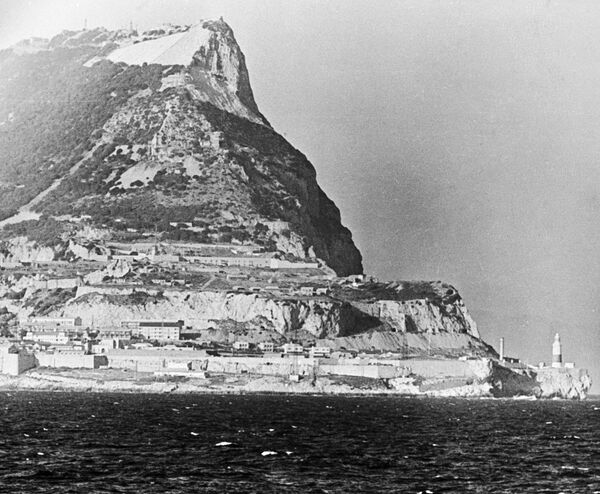MOSCOW. (RIA Novosti political commentator Andrei Fedyashin) - On July 21, Spain's foreign minister Miguel Angel Moratinos became the first Spanish government official to visit Gibraltar since 1704 when a combined British-Austrian force seized control of it during the War of the Spanish Succession.
Gibraltar is a self-governing British overseas territory located on the southern end of the Iberian Peninsula and Europe at the entrance of the Mediterranean overlooking the Strait of Gibraltar. Spain ceded sovereignty of Gibraltar to Great Britain under the 1713 Treaty of Utrecht that brought an end to the said war.
Mr Moratinos held talks with his UK counterpart David Miliband, and the Chief Minister of Gibraltar, Peter Caruana.
In the run-up to the meeting, the British press said Mr Moratinos was allowed to visit Gibraltar, also known as The Rock, on the condition that he would not raise the issue of the territory's sovereignty.
In the morning of July 22, British papers told their readership that the talks had been successful, and that the issue of Gibraltar's sovereignty was not discussed.
After returning to Madrid, the Spanish minister also called the talks a success, while affirming that Spain would never renounce its claim to sovereignty of Gibraltar.
Such diplomatic wrangling has continued during the so-called Tripartite Forum to settle the Gibraltar issue for the past 20 years. However, the Chief Minister of Gibraltar takes only a nominal part in British-Spanish negotiations.
At the current round of the Tripartite Forum, a decision was reached to expand financial, legal and maritime cooperation. This latter aspect is the most difficult area for collaboration as Madrid announced in the run-up to the talks that the waters around Gibraltar had special environmental value and subsequently deployed additional naval patrols there.
The pro-British territory of Gibraltar said Spain was laying claims to its territorial waters, and that it would sue Madrid at the European Court of Justice (ECJ).
A sense of passion and flurry still resonates around Gibraltar ever since August 4, 1704 when the British fleet under the command of Admiral Sir George Rooke, assisted by Field Marshal Prince George of Hesse-Darmstadt, captured the town of Gibraltar and claimed it in the name of the Archduke Charles.
Madrid on numerous occasions tried to recapture the strategic territory, which was besieged by a combined Spanish-French fleet during the American Revolution (the Great Siege of Gibraltar) from 1779 to 1783.
The British, who have throughout history regularly repelled all attacks on Gibraltar, organize sovereignty referendums asking local voters whether they wish to pass under Spanish sovereignty, or remain under British sovereignty, or whether they prefer joint sovereignty.
At each plebiscite, an overwhelming majority of the territory's 28,875-strong population rejects joint British-Spanish sovereignty and hangs out their Union Jack flags in support of London. This is hardly surprising as most Gibraltar residents are either former British citizens or their descendants.
Today, Gibraltar stands as a major European paradox and anachronism. Although the territory no longer sours British-Spanish relations, it is hard to believe that a European state which is a member of the UN and its Special Committee on Decolonization, the European Union and NATO still has a colony on the territory of another European state, also a UN member and member of the above-said committee on decolonization.
On May 30, 1969, a new constitution for Gibraltar was introduced by the British Parliament on the initiative of the British Government (Gibraltar Constitution Order 1969). Under the new document, Gibraltar attained full internal self-government, with an elected House of Assembly.
However, when asked why the Special Committee on Decolonization lists Gibraltar among non-self-governing territories, or colonies, British diplomats usually decline to answer. Such behavior resembles that of greedy folk being asked for loans.
British maneuvering on the Gibraltar issue provides an entirely new insight into London's arguments for recognizing the independence of Kosovo. This is particularly true of claims that each case of sovereignty and independence should be examined in its own unique context.
Prior to the August 2008 conflict with Georgia over the breakaway province of South Ossetia, Russia insisted on the universal nature of the approach to Kosovo's independence and lost.
After Georgian President Mikhail Saakashvili's forces attacked South Ossetia, Moscow manifested a "special approach" and won, eventually recognizing the independence of South Ossetia and Abkhazia.
We should follow more closely all the developments surrounding the Gibraltar issue as the concerned parties are resorting to an assortment of arguments, which could prove fruitful in the future.
The opinions expressed in this article are the author's and do not necessarily represent those of RIA Novosti.

